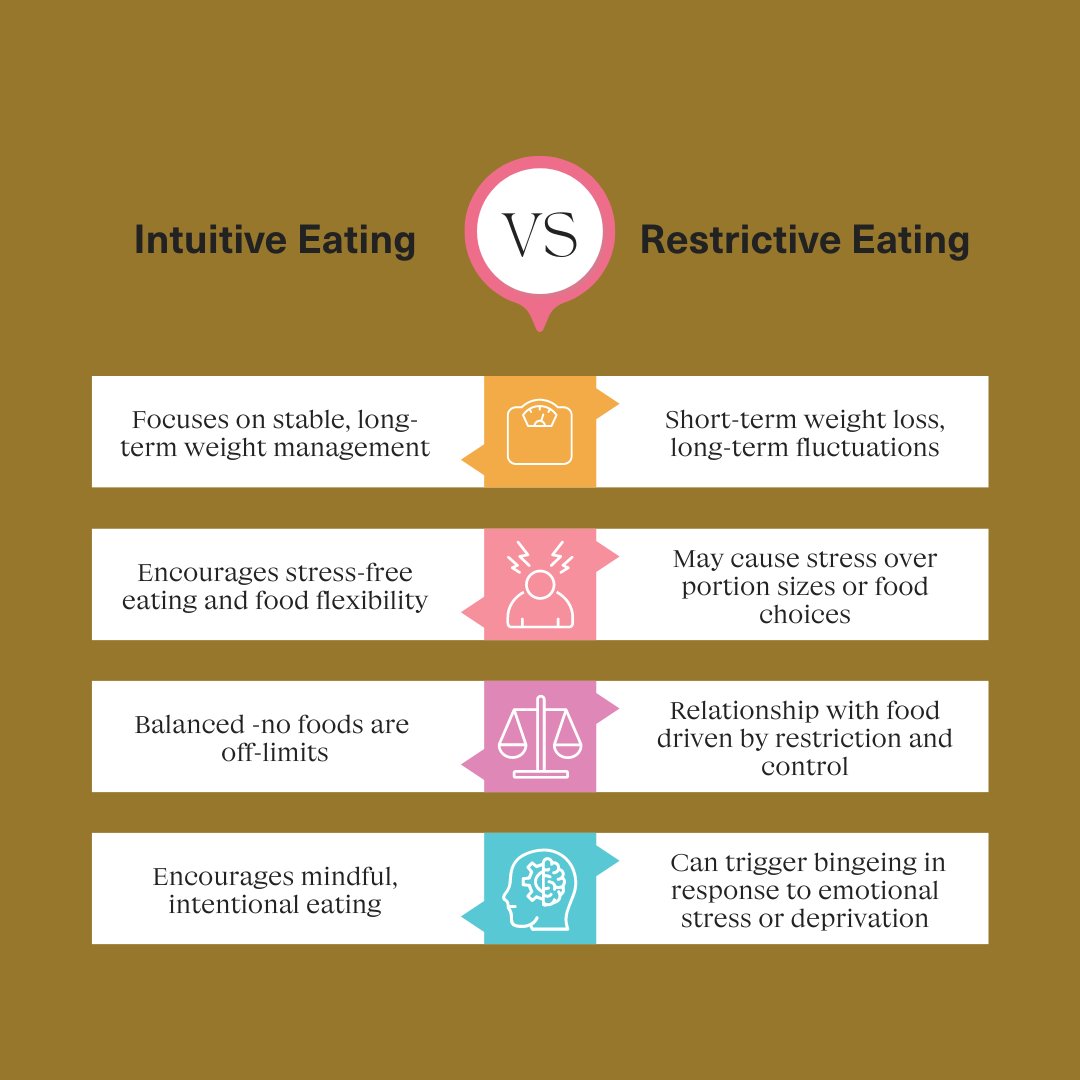Intuitive Eating for Health & Wellness | Nutritionist-Approved Tips
Subject
Intuitive Eating
Date
11 October 2024

Sana, one of my clients, struggled with binge eating, especially when she felt stressed or overwhelmed. Together, we embraced intuitive eating to help her recognise her emotional triggers. By focusing on hunger cues, she was able to stop using food as a coping mechanism.
Intuitive Eating for Wellness & Weight Loss
In a world filled with fad diets and conflicting advice, intuitive eating offers a balanced, sustainable approach to food. This method helps break the exhausting cycle of dieting, calorie counting, and food guilt, promoting a healthier relationship with eating. It offers a way to reconnect with your body’s natural hunger and fullness signals, helping you build a healthier, more sustainable relationship with food—free from the stress and restrictions of traditional diets.
If you’ve found yourself stuck in an endless cycle of dieting, feeling guilty about food choices, or using food to cope with stress, mindful eating might be the solution you’re looking for.
Rather than focusing solely on changing specific habits—whether it’s related to food, alcohol, or other behaviours—it’s important to understand the underlying motivations driving them. This shift in perspective is key to transforming your relationship with food through intuitive eating.
What is Mindful Eating?
It’s a mindful approach to food that encourages you to listen to your body and honour its needs. Rather than following external diet rules, intuitive eating focuses on internal cues—eating when you’re hungry, stopping when you’re full, and choosing foods that make you feel good.
Unlike traditional diets, mindful eating doesn’t revolve around the pursuit of weight loss. It’s about trusting your body’s signals, allowing all foods in moderation, and distinguishing between emotional and physical hunger to develop a healthier relationship with food that’s free from guilt and anxiety.
How can this approach support weight loss?
While the primary goal of intuitive eating is to heal your relationship with food, some people may experience weight loss as a by-product of becoming healthier. The goal is to find your body’s natural set point—where it feels best, functions optimally, and is healthiest.
Here’s how it might lead to weight loss:
- Reducing Emotional Eating: By addressing emotional triggers without turning to food, intuitive eating can help reduce overeating.
- No More Bingeing: When you stop restricting certain foods, the urge to overeat or binge diminishes.
- Respecting Hunger and Fullness Cues: By eating when you’re truly hungry and stopping when you’re full, you may naturally consume fewer calories without feeling deprived.
- Sustainable Habits: Intuitive eating helps you develop long-term habits that support wellness, rather than focusing solely on a number on the scale.
Over time, as you start trusting your body’s signals, the body may naturally find a weight that aligns with your overall health and well-being.
Interested in starting your mindful eating journey? Schedule a free consultation with one of our dietitians today.
Intuitive Eating vs. Restrictive Eating

Key Benefits of Eating Mindfully
There’s a growing body of research on its benefits on both mental and physical health:
Enhanced Psychological Well-being
Intuitive eating is closely linked to improved mental health. Recent research has shown that individuals who adopt this approach report lower levels of anxiety and depression, and greater body satisfaction. Key benefits include:
- Reduced stress, anxiety, and depression.
- Increased body satisfaction and self-acceptance.
- Overall improvement in mental well-being.
A study by Tylka et al. (2019) found that intuitive eating helps reduce psychological distress and fosters a healthier relationship with food. Additionally, Spinelli et al. (2024) highlighted that intuitive eating supports a better quality of life.
Decreased Disordered Eating Habits
One of its main advantages is its ability to curb unhealthy food behaviours. Key outcomes include:
- Fewer binge eating episodes.
- Reduced emotional and restrictive eating.
- A more stable, balanced approach to food.
Bruce and Ricciardelli (2016) found that it promotes healthier, more consistent eating patterns, helping individuals avoid the cycle of restrictive dieting.
Physical Health Benefits
Intuitive eating also benefits physical health. While weight loss isn’t the focus, the following health improvements are common:
- Better cardiovascular health (lower cholesterol and blood pressure).
- Stable and healthy weight maintenance over time.
- Lower likelihood of engaging in harmful dieting behaviours.
Van Dyke and Drinkwater (2014) found that it is associated with improvements in key physical health markers.
Sustainable Long-term Health
Unlike traditional diets, intuitive eating fosters a balanced, long-term approach to health. Key points include:
- Sustainable weight management without the psychological toll of dieting.
- Improved overall well-being and relationship with food.
- Long-term physical and mental health benefits.
Research by Spinelli et al. (2024) indicated that individuals practising intuitive eating can manage their weight and health more effectively without restrictive dieting.
Mindful eating offers both mental and physical health benefits that go beyond traditional dieting. By embracing this approach, you can improve your eating habits and your overall quality of life.
How to Get Started with Intuitive Eating
- Listen to Your Body: Begin by paying attention to your body’s hunger and fullness cues. Eat when you’re hungry and stop when you’re comfortably full.
- Reject Diet Culture: Let go of the diet mentality that labels foods as “good” or “bad.” Instead, focus on how food makes you feel and what nourishes your body.
- Savour the Eating Experience: Slow down and enjoy your meals. Pay attention to the flavours, textures, and satisfaction that food provides. Whether it’s a wholesome salad or a decadent treat, by fully experiencing your food, you’ll naturally feel more satisfied and less likely to overeat.
- Be Kind to Yourself: Intuitive eating is a journey, not a quick fix. Practice self-compassion and give yourself permission to make mistakes along the way.
To fully embrace intuitive eating, it’s important to follow a structured approach. At Nutribeings, we guide clients through our comprehensive 5-Stage Methodology that helps break free from diet culture and build a lasting, healthy relationship with food. Learn more about our 5-Stage Methodology and how it can support your mindful eating journey.
Common Questions About Intuitive Eating and Weight Loss
- Can I lose weight with intuitive eating?
Yes, it’s possible, but weight loss is not the primary focus of intuitive eating. The goal is to build a healthy relationship with food, and any changes in weight are a byproduct of this journey.
- What if I gain weight with intuitive eating?
Intuitive eating encourages you to trust your body and respect its natural set point. Whether you lose, gain, or maintain weight, the focus should remain on improving your relationship with food and your overall well-being.
- Is intuitive eating right for everyone?
While it can benefit many people, it may not be the right fit for everyone, particularly those who are dealing with severe eating disorders and/or medical conditions. In such cases, a structured approach guided by healthcare professionals, including dietitians and mental health specialists, might be more suitable.
How Can a Dietitian Help with Intuitive Eating?
If you’re wondering whether mindful eating is the right approach for you, working with a dietitian can provide the clarity, guidance and personalised support you need. Many people experience anxiety around eating, often focusing on weight loss or struggling with binge eating or disordered eating patterns. A dietitian experienced in intuitive eating can help guide you through these challenges, using interviewing techniques to better understand your relationship with food and to identify the underlying causes of emotional eating.
Rather than prescribing restrictive diets or focusing solely on weight loss, a dietitian helps you heal your relationship with food, reduce stress, and ease any anxieties related to eating. For those using food as a way to cope with emotions, a dietitian will work with you to increase awareness of your eating habits.. One practical tool might be rating your hunger levels before and after a meal on a scale of 1 to 5. This encourages mindfulness, allowing you to tune into your body’s natural hunger and fullness cues rather than relying on food for emotional comfort.
Dietitians provide personalised advice, tailored to your unique needs and lifestyle, helping you navigate the complexities of letting go of diet culture. With their guidance, you can develop a balanced, flexible approach to eating that fosters mental and physical health. By encouraging mindful eating and addressing emotional triggers, they empower you to enjoy all types of food without guilt, ultimately helping you to build a healthy, stress-free relationship with food.
At Nutribeings, our founder Sonam Hitendre brings years of expertise in helping clients on their intuitive eating journeys. Her qualifications include:
- MSc Nutrition and Dietetics RD (Registered Dietitian)
- MSc Public Health Nutrition MPH (Public Health Nutritionist)
- Certified Dietitian Nutrition Coach
- Certified Fertility Dietitian
How much does it cost to work with a Dietitian for Intuitive Eating?
For less than the cost of many fad diets, you can work with our dietitians to transform your relationship with food and improve your well-being. Our personalised programmes start at just £199/month.




